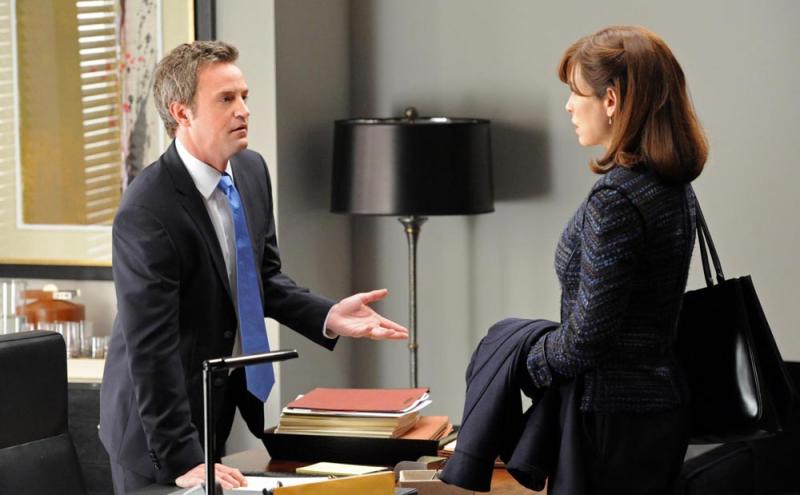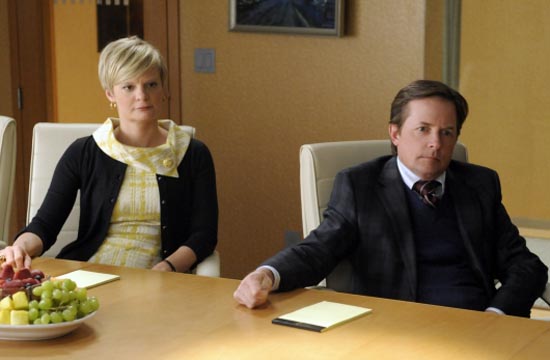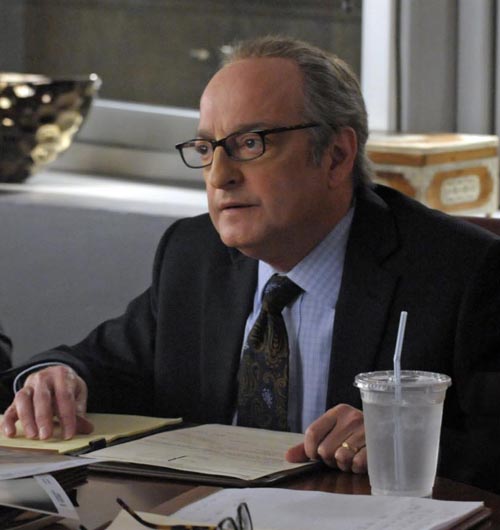The Good Wife, Series 3 Finale, More4 | reviews, news & interviews
The Good Wife, Series 3 Finale, More4
The Good Wife, Series 3 Finale, More4
Fine cast, great writing in virtuoso legal drama

All good things must come to an end, but at least if it's a fully tooled-up American drama series it comes to an end a lot more slowly. Where the BBC serves up six episodes of Silk or a ridiculous three of Sherlock, the third season of The Good Wife finally drew to a close with its 22nd instalment.
It's hard going for writers, actors and crew, but the benefits of such an extended run are plastered all over the screen, week in and week out. In Britain, at least, The Good Wife hasn't earned itself those "greatest TV show ever made!" accolades lobbed at The Sopranos or The Wire by the more hysterical species of critic, though Clive James recently gave it a belated rave in his Telegraph column. Yet if you run the microscope over it, it probably deserves them just as much as its trendier HBO counterparts (it's made by CBS).
 The writing is almost always superb, which has attracted a calibre of cast rarely seen on any TV network, cable or otherwise. The regular core of characters - Julianna Margulies as the titular spouse Alicia Florrick, Christine Baranski and Josh Charles as the senior legal partners at Lockhart Gardner, Archie Panjabi as mercurial investigator Kalinda, Alan Cumming as the wily Eli Gold and Chris Noth as Alicia's husband Peter - are all platinum-plated A-listers, but it's the strength in depth of the acting that's truly astonishing.
The writing is almost always superb, which has attracted a calibre of cast rarely seen on any TV network, cable or otherwise. The regular core of characters - Julianna Margulies as the titular spouse Alicia Florrick, Christine Baranski and Josh Charles as the senior legal partners at Lockhart Gardner, Archie Panjabi as mercurial investigator Kalinda, Alan Cumming as the wily Eli Gold and Chris Noth as Alicia's husband Peter - are all platinum-plated A-listers, but it's the strength in depth of the acting that's truly astonishing.
The Good Wife has a mini-constellation of reinforcements who can be rotated in and out to throw new light on personal relationships or prise open some arcane backwater of the law. This season-closer saw another appearance of Michael J Fox as the conniving lawyer Louis Canning, teaming up with the raucous and blowsy Patti Nyholm (Martha Plimpton) to try to drive a professional stake through the heart of Lockhart Gardner (Fox and Plimpton pictured above). Fox's performance is fascinating for the way it builds the actor's Parkinson's disease into a portrayal of a lawyer with a "neurological disorder", but using it to serve the drama rather than as an attention-grabbing gimmick.
This series has also seen some brilliant moments arising from the love life of Diane Lockhart (Baranski), regal doyenne of the bien-pensant liberal elite but comically unable to resist a grizzled man of action, be he ever so politically incorrect. There was a comeback by Gary Cole as ballistics expert and outdoorsman Kurt McVeigh, now being rivalled in Diane's affections by rugged Australian process-server Jack Copeland (Bryan Brown). The scene a couple of episodes back where a flustered Diane had both of them on call-holding was farcical in the finest sense.
 Another reliable Good Wife trick is using the regular courtroom scenes as a stage for a colourful parade of judges, who run the gamut from bossy and bigoted to eccentric and delusional. Last week's episode made extra space for a guest role by the excellent David Paymer as Judge Cuesta (pictured below), suspended from duties while he was investigated for his conduct as a prosecutor in a 20-year-old case. Switching him from the bench to the trenches, where he was forced to rely on Lockhart Gardner's expert but ethically suspect tactics to save his career, allowed the writers to perform a psychological dissection, exposing the weakness and bluster behind his usual judicial facade.
Another reliable Good Wife trick is using the regular courtroom scenes as a stage for a colourful parade of judges, who run the gamut from bossy and bigoted to eccentric and delusional. Last week's episode made extra space for a guest role by the excellent David Paymer as Judge Cuesta (pictured below), suspended from duties while he was investigated for his conduct as a prosecutor in a 20-year-old case. Switching him from the bench to the trenches, where he was forced to rely on Lockhart Gardner's expert but ethically suspect tactics to save his career, allowed the writers to perform a psychological dissection, exposing the weakness and bluster behind his usual judicial facade.
One day the show will run out of juice, but it must be good for another couple of seasons at least. The "long arc" is the still-evolving saga of Alicia's fractured relationship with estranged husband Peter, currently State's Attorney but on the brink of running for Governor of Illinois (for which his rival is the treacherous Mike Kresteva, played with a dash of pure evil by Matthew Perry). As the series ended, the Florricks' private life swung back to centre stage, with Alicia poised on the doorstep of the former family home, agonising over whether to rejoin Peter and their two children inside. The seamless knitting together of private lives, politics and the law creates the arena in which The Good Wife's many qualities can flourish.
Share this article
The future of Arts Journalism
You can stop theartsdesk.com closing!
We urgently need financing to survive. Our fundraising drive has thus far raised £49,000 but we need to reach £100,000 or we will be forced to close. Please contribute here: https://gofund.me/c3f6033d
And if you can forward this information to anyone who might assist, we’d be grateful.

Subscribe to theartsdesk.com
Thank you for continuing to read our work on theartsdesk.com. For unlimited access to every article in its entirety, including our archive of more than 15,000 pieces, we're asking for £5 per month or £40 per year. We feel it's a very good deal, and hope you do too.
To take a subscription now simply click here.
And if you're looking for that extra gift for a friend or family member, why not treat them to a theartsdesk.com gift subscription?
more TV
 Down Cemetery Road, Apple TV review - wit, grit and a twisty plot, plus Emma Thompson on top form
Mick Herron's female private investigator gets a stellar adaptation
Down Cemetery Road, Apple TV review - wit, grit and a twisty plot, plus Emma Thompson on top form
Mick Herron's female private investigator gets a stellar adaptation
 theartsdesk Q&A: director Stefano Sollima on the relevance of true crime story 'The Monster of Florence'
The director of hit TV series 'Gomorrah' examines another dark dimension of Italian culture
theartsdesk Q&A: director Stefano Sollima on the relevance of true crime story 'The Monster of Florence'
The director of hit TV series 'Gomorrah' examines another dark dimension of Italian culture
 The Monster of Florence, Netflix review - dramatisation of notorious Italian serial killer mystery
Director Stefano Sollima's four-parter makes gruelling viewing
The Monster of Florence, Netflix review - dramatisation of notorious Italian serial killer mystery
Director Stefano Sollima's four-parter makes gruelling viewing
 The Diplomat, Season 3, Netflix review - Ambassador Kate Wyler becomes America's Second Lady
Soapy transatlantic political drama keeps the Special Relationship alive
The Diplomat, Season 3, Netflix review - Ambassador Kate Wyler becomes America's Second Lady
Soapy transatlantic political drama keeps the Special Relationship alive
 The Perfect Neighbor, Netflix review - Florida found-footage documentary is a harrowing watch
Sundance winner chronicles a death that should have been prevented
The Perfect Neighbor, Netflix review - Florida found-footage documentary is a harrowing watch
Sundance winner chronicles a death that should have been prevented
 Murder Before Evensong, Acorn TV review - death comes to the picturesque village of Champton
The Rev Richard Coles's sleuthing cleric hits the screen
Murder Before Evensong, Acorn TV review - death comes to the picturesque village of Champton
The Rev Richard Coles's sleuthing cleric hits the screen
 Black Rabbit, Netflix review - grime and punishment in New York City
Jude Law and Jason Bateman tread the thin line between love and hate
Black Rabbit, Netflix review - grime and punishment in New York City
Jude Law and Jason Bateman tread the thin line between love and hate
 The Hack, ITV review - plodding anatomy of twin UK scandals
Jack Thorne's skill can't disguise the bagginess of his double-headed material
The Hack, ITV review - plodding anatomy of twin UK scandals
Jack Thorne's skill can't disguise the bagginess of his double-headed material
 Slow Horses, Series 5, Apple TV+ review - terror, trauma and impeccable comic timing
Jackson Lamb's band of MI5 misfits continues to fascinate and amuse
Slow Horses, Series 5, Apple TV+ review - terror, trauma and impeccable comic timing
Jackson Lamb's band of MI5 misfits continues to fascinate and amuse
 Coldwater, ITV1 review - horror and black comedy in the Highlands
Superb cast lights up David Ireland's cunning thriller
Coldwater, ITV1 review - horror and black comedy in the Highlands
Superb cast lights up David Ireland's cunning thriller
 Blu-ray: The Sweeney - Series One
Influential and entertaining 1970s police drama, handsomely restored
Blu-ray: The Sweeney - Series One
Influential and entertaining 1970s police drama, handsomely restored
 I Fought the Law, ITVX review - how an 800-year-old law was challenged and changed
Sheridan Smith's raw performance dominates ITV's new docudrama about injustice
I Fought the Law, ITVX review - how an 800-year-old law was challenged and changed
Sheridan Smith's raw performance dominates ITV's new docudrama about injustice

Add comment